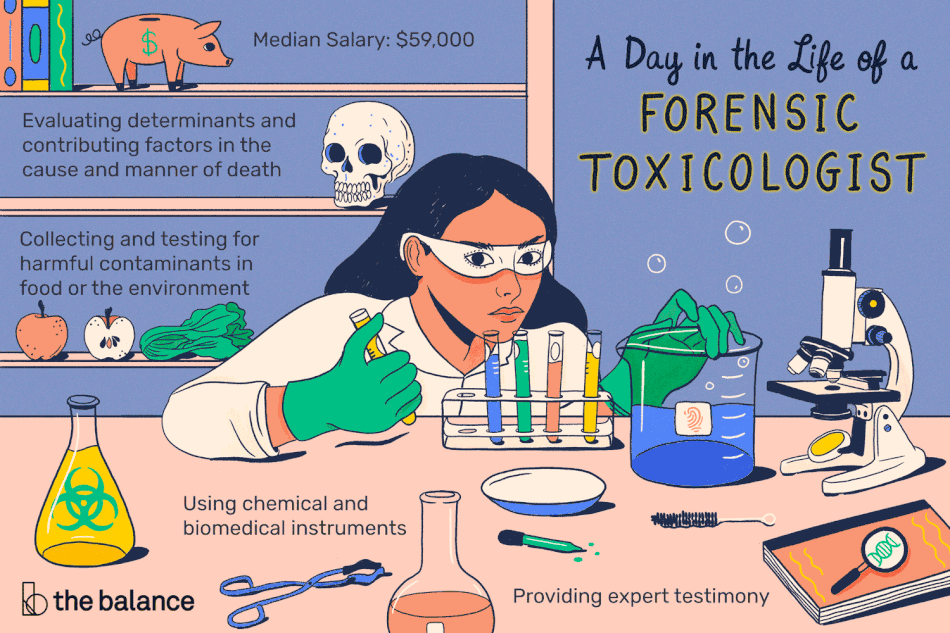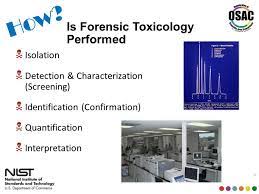Introduction
Crime is a common malpractice recorded in almost every region across the globe. Experts in criminal justice systems engage in forensic investigations to gather information, make proper analyses, and present convincing conclusions about perpetrators. Some of the key areas to consider include blood, hard disks, fingerprints, fluids, and residues. The field of toxicology is critical and forms one of the foundations in forensic science. The area has gained prominence due to the increasing number of illicit substances, alcohol, and poisons found in criminal cases. This research paper describes toxicology as one of the leading branches in the field of forensic science.
Analysis of Forensic Toxicology
The term “toxicology” has emerged as a discipline that deals with medicine, chemistry, and pharmacology. Specifically, it revolves around the study and analysis of chemicals and their possible impacts on living organisms in different ecological zones. Experts in this field diagnose the possible impacts of chemicals and treat the medical problems associated with a wide range of toxicants (Fakiha, 2018). Over the years, professionals in the field of toxicology have been keen to study the nature of poisons and present a number of evidence-based approaches for maximizing safety. This goal is examined by analyzing both the benefits and negativities of some of the chemicals used by human beings.
Through scientific analyses and investigations, toxicologists are usually able to determine and predict the possible effects of chemicals. They will share the acquired information with members of the public and policymakers to mitigate some of the possible hazards and health problems. To support the realization of positive results, professionals in this field will consider various aspects to ensure that timely results are recorded. For instance, they can examine how a specific chemical could affect human beings and other creatures depending on the exposure duration, concentration, and temperature (Yadav & Tiwari, 2017). They might also be interested on the unique age or stage of development of the victim. The long-term implication of toxins on the human body is another key area for concern.
To achieve the intended results, experts in this field would usually utilize advanced systems, computers, and reagents in toxicology labs to ensure that desirable results are recorded. They will follow clearly defined procedures and methodologies to detect chemicals and determine with finality how they can affect individuals’ lives and/or biological systems. When investigating a criminal case, such professionals can isolate specific substances and determine how they could be associated with the specific case (Smith & Bluth, 2016). The advances made so far in this field have helped jurists, courts, and judges to make proper convictions and judgments based on the presented findings.
Usefulness
The power of toxicology makes it a powerful process for pursuing forensic investigation goals. With the world characterized by numerous chemicals that are deemed dangerous and capable of impacting human activities and goals, the field has become useful and capable of supporting the provision of justice to many people (Smith & Bluth, 2016). For instance, toxicology becomes a forensic practice when police officers want to investigate the cause of death in post-mortem analyses. In such a scenario, the investigators could be keen to analyze and identify whether a specific amount of drug could be linked to the targeted death. This approach would make it possible for players in the criminal justice system to achieve their aims.
Similarly, toxicology has become a critical practise or procedure whereby scientists rely on their expertise to monitor and examine the nature of specific substances that are deemed dangerous. Through toxicology, experts can determine how different age groups or individuals embrace the use of specific substances, including illicit drugs and chemicals. In different parts of the world, homicides and accidents remain common in the domestic setting. In most of the cases, reporters identify specific substances and chemicals that are used to commit suicide (Fakiha, 2018). Through toxicological investigations, professionals can analyze such trends and provide additional guidelines for helping more people to protect themselves against some of these chemicals.

When toxicologists provide their analyses and findings, it can be possible for some of the involved stakeholders to support the formulation of new policies and laws to prevent misuse of such chemicals. This approach can help governments make better laws to govern the possession and use of various substances that are deemed poisonous (Hayes, 2017). This practice explains how and why different jurisdictions have helped present additional guidelines that have helped reshape the power of forensic science.

In some criminal cases involving dosage of hazardous chemicals, toxicology can help most of the involved partners to understand the specific chemical and propose the best measures to treat the victim. This advancement explains why more medical institutions have helped save lives of many people who might have been drugged with poisonous chemicals. The field has also become useful in helping determine environmental contaminations and discharges that might have negative impacts on animals, aquatic life, and even human beings (Fakiha, 2018). Within the areas of traffic, foreign immigration, and drug dealing, forensic toxicology has helped apprehend criminals and support the presentation of superior measures to help protect innocent civilians. These applications reveal that toxicology will continue to play a dominant role in the forensic investigations.
Case Studies
Forensics has become crucial in criminal investigations and court cases. The use of toxicology remains a common practice aimed to get adequate evidence that could be applied to overturn convictions, acquaint, or support witness accounts. The first case revolving around the use of toxicology is the one surrounding the death of Nicholas Odze, a 4-year old child who had died mysteriously (Olmeda, 2015). The official report by the boy mother, Bernabe Raisa, revealed that he had died after getting a prescription of Lunesta. The mother had administered such a drug after realizing that he was unable to sleep. The toxicology examinations and tests were done following the occurrence indicated that the child’s system had a number of chemicals, including eszopiclone, oxycodone, and ibuprofen (Olmeda, 2015). Following such findings and reports, the relevant authorities were incapable of filing any charge against the boy’s parents. Additionally, the completed investigations indicated that the child had not experienced any form of internal injury or trauma. This case, therefore, shows how toxicology is a useful field that can guide jurists and judges to arrive at an acceptable conclusion much faster.
The second outstanding case resolved through the power of toxicology was the one involving Janie Lou Gibbs. This woman was believed to have planned and murdered her three sons, her husband, and one of her grandchildren. After a failed attempt to kill her husband using rat poison, Gibbs would eventually bring some soup with arsenic (Chase, 2019). All these murders Gibbs committed revolved around the use of chemicals and she would donate the insurance proceeds of the deceased to the local church. The family physician would later decide to perform some toxicological tests on Robert’s body, one of Gibb’s sons (Chase, 2019). Forensic toxicologists would exhume the bodies of the other deceased family members only to realize that they had all died as a result of poison-related homicide. Following such findings, the court could apprehend and convict Gibbs for the deaths of the three victims.
From these landmark cases, it would be agreeable that toxicology is a useful field that will continue to reshape forensic investigations. Experts in the field have found it easier to examine the available evidence and make the relevant decisions that make it easier for legal experts and judges to pass the most befitting judgments (Chase, 2019). The studied cases also support the fact that forensic toxicology that should be expanded and supported since it can help resolve even most of the complex criminal cases in the world today.
Conclusion
The above discussion has identified toxicology as a useful field that has gained increased relevance in forensic investigations. Toxicologists can apply their competencies to perform tests on drugs and poisons and determine how they might have been used to aid in criminal activities. The findings and judgments made in the selected two cases support the appropriateness of toxicology and it continues to reshape forensic and criminal justice procedures. In conclusion, analysts and experts should be on the lookout for emerging ideas to improve the field and promote the effectiveness of the criminal justice system.
References
Chase, J. (2019). Murder by poison: Two high-profile forensic toxicology cases. Author Jennifer Chase. Web.
Fakiha, B. (2018). Forensic toxicology and legal investigation of death, poisoning, and drug use. International Journal of Sciences: Basic and Applied Research, 42(5), 37-44. Web.
Hayes, A. W. (2017). Toxicology research and application. Toxicology Research and Application, 1(1), 12.
Olmeda, R. (2015). Parkland mom accused in child’s death commits suicide. Sun Sentinel. Web.
Roufa, T. (2019). What does a forensic toxicologists do? The Balance Careers. Web.
Smith, M. P., & Bluth, M. H. (2016). Forensic toxicology. Clinics in Laboratory Medicine, 36(4), 753-759.
Yadav, M., & Tiwari, A. (2017). Forensic toxicology and its relevance with criminal justice delivery system in India. Forensic Research & Criminology International Journal, 4(4), 122-128.